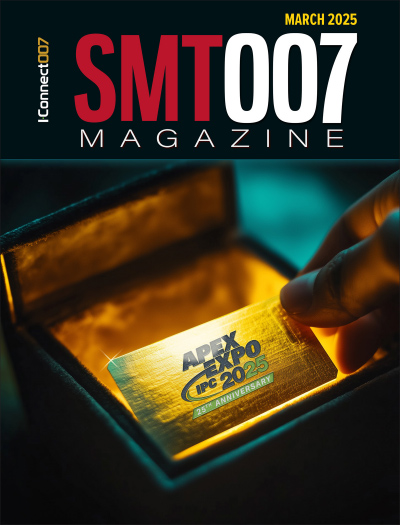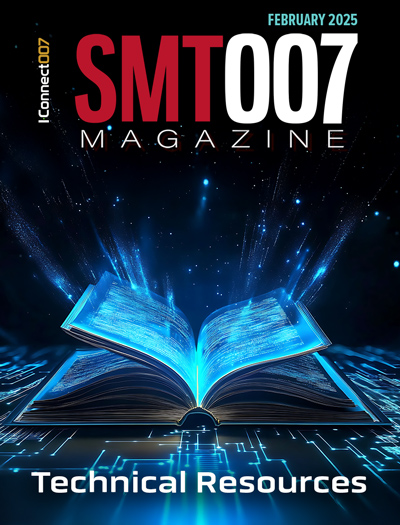-

- News
- Books
Featured Books
- smt007 Magazine
Latest Issues
Current Issue
IPC APEX EXPO 2025: A Preview
It’s that time again. If you’re going to Anaheim for IPC APEX EXPO 2025, we’ll see you there. In the meantime, consider this issue of SMT007 Magazine to be your golden ticket to planning the show.

Technical Resources
Key industry organizations–all with knowledge sharing as a part of their mission–share their technical repositories in this issue of SMT007 Magazine. Where can you find information critical to your work? Odds are, right here.

The Path Ahead
What are you paying the most attention to as we enter 2025? Find out what we learned when we asked that question. Join us as we explore five main themes in the new year.
- Articles
- Columns
Search Console
- Links
- Media kit
||| MENU - smt007 Magazine
IPC Issues Call for Papers for Third Annual IPC High Reliability Forum
August 30, 2018 | IPCEstimated reading time: 1 minute
IPC — Association Connecting Electronics Industries invites engineers, researchers, academics, technical experts and industry leaders to submit abstracts for IPC High Reliability Forum to be held May 14–16, 2019 in Hanover (Baltimore), Maryland.
IPC High Reliability Forum provides presenters and their companies with a notable and cost-effective opportunity to promote their expertise and gain visibility with key engineers, managers and executives across the electronics industry supply chain. Staff from companies such as NASA Goddard Space Flight Center, Honeywell Aerospace, Lockheed Martin Missiles and Fire Control, Motorola and Raytheon have presented papers at past IPC High Reliability Forums.
With a focus on electronics subjected to harsh use environments, expert papers and presentations are being sought on the following topics:
- Mechanical stress reliability - vibration and shock Methods (software) for predicting reliability
- Failure Modes Effects Analysis (FMEA)
- Thermal Mitigation
- Thermal Stress Test Methods
- HDI Reliability
- Microvia Failures and Testing Methods
- Microvia Reliability
- Design for Reliability
- Design Rules for Spacing and Staggered Vias
- Failures Related to Laminate Materials
- Materials Compatibility
- System-level effects on Solder Joint Reliability
- Assembly Tests for Solder Joint Reliability
Abstracts summarizing original and previously unpublished work must be submitted for consideration to present. Presentations should be non-commercial and describe significant results from experiments, emphasize new techniques, discuss trends of interest and contain technical and/or appropriate test results. Final presentations should be 45 minutes in length, including time for questions and answers.
About IPC
IPC is a global industry association based in Bannockburn, Illinois, dedicated to the competitive excellence and financial success of its 4,400+ member company sites which represent all facets of the electronics industry, including design, printed board manufacturing, electronics assembly and test. As a member-driven organization and leading source for industry standards, training, market research and public policy advocacy, IPC supports programs to meet the needs of an estimated $2 trillion global electronics industry. IPC maintains additional offices in Taos, N.M.; Washington, D.C.; Atlanta, Ga.; Brussels, Belgium; Stockholm, Sweden; Moscow, Russia; Bangalore and New Delhi, India; Bangkok, Thailand; and Qingdao, Shanghai, Shenzhen, Chengdu, Suzhou and Beijing, China.
Suggested Items
AIM Solder Partners with Performance Technologies Group for Sales Representation in Northeast US
03/12/2025 | AIM SolderAIM Solder, a global leader in solder assembly materials for the electronics industry, is excited to announce its new partnership with Performance Technologies Group, Inc. (PTG), an established electronic manufacturers’ representative.
Indium Corporation, Industry Partners to Showcase Products 'Live@APEX'
03/10/2025 | Indium CorporationIndium Corporation®, in cooperation with its industry partners, will feature its proven solder solutions live on the show floor throughout IPC APEX Expo from March 18-20 in Anaheim, California.
Indium Experts to Present on Solder and Thermal Solutions at APEX 2025
03/07/2025 | Indium CorporationAs a global supplier of solder and thermal interface material (TIM) products, Indium Corporation experts are proud to share their technical insight and knowledge on a variety of industry-related topics at IPC APEX Expo, March 18-20 in Anaheim, California.
Indium to Showcase High-Reliability Solder Technology at IPC APEX EXPO 2025
03/05/2025 | Indium CorporationIndium Corporation®, a leading materials provider for the electronics assembly market, will feature its high-reliability solder solutions at IPC APEX EXPO 2025, taking place March 18-20 in Anaheim, California.
Black Diamond Orders Hentec Industries/RPS Automation Vector 300 with EMP Upgrade
03/03/2025 | Hentec Industries/RPS AutomationThe Vector 300 is the most compact model in the selective soldering Vector series lineup, making it ideal for facilities with limited space. Despite its size, the Vector 300 can process boards up to 300 x 300 mm (11.8 x 11.8 in.).


